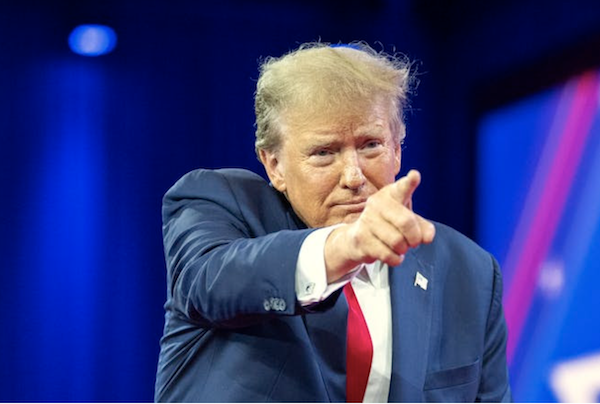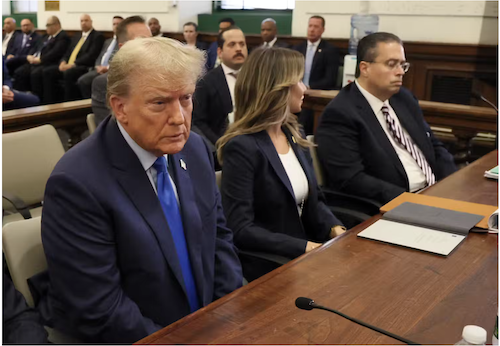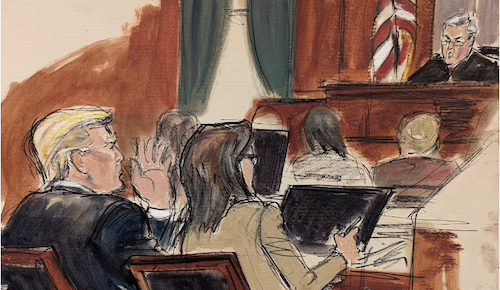
Donald Trump picks his targets carefully and seeks to undermine their legitimacy. AP Photo/Alex Brandon
Donald Trump has done it again. And again.
In a series of social media posts, the former president personally attacked the daughter of the judge presiding over his criminal trial in New York state.
Among other claims, his posts include allegations that the judge’s daughter is a “Rabid Trump Hater, who has admitted to having conversations with her father about me.”
Because of this alleged bias, Trump’s attorneys have argued that Judge Juan Merchan cannot be impartial and therefore should step down from the case.
Merchan, however, didn’t see things this way. Instead, the judge extended the gag order already imposed on Trump to include attacks on family members of the judge and the prosecution team.
In response, Trump has reportedly filed a lawsuit directly against the judge, though the exact claims remain under seal with the court.
Trump’s attacks on Merchan and his daughter are just the latest in his long effort to undermine the rule of law. The attacks demonstrate his efforts to appear to play by the rules, but in reality to violate the norm of respect for the judiciary that previous presidents have followed, even when they disagreed with court decisions.
As a professor of legal studies and political science, I have extensively examined the ways in which presidents talk about judges and their decisions, and the consequences of that behavior.
Here’s why – and how – what Trump says matters.

Donald Trump apparently does not like being in a courtroom. Brendan McDermid/Pool Photo via AP
Trump’s playbook
In general, by alleging that his prosecutions are political, Trump is attempting to shift the public’s perception of his trials away from the due process of the justice system and toward viewing Trump himself as a victim of abuse of power by his political opponents.
To do this, Trump has been following a fairly consistent playbook in his attacks on the judges, court staff, witnesses and opposing lawyers involved in his many civil and criminal trials. He seeks to subvert the system by using its mechanisms for his own ends – which are to avoid having his day in court, rather than facing a judge and jury and seeking vindication.
First, he attacks those whom he claims are his political enemies, alleging that the various lawsuits and criminal charges brought against him are politically motivated and a form of election interference. This allows him to frame the cases in a politically advantageous way by portraying himself as the victim, seeking the support and sympathy of his electoral base.
It also puts the judges overseeing the cases in a tough spot: Since so many of Trump’s attacks are personal, they may put judges, lawyers, witnesses and court staff in physical danger from violence by his supporters. But if the judge does something about that danger, like institute a gag order, Trump can use that as further evidence that the judge is biased.
Second, once a gag order is in place, as it is in three cases now, Trump pushes its boundaries as far as he can go. These moves may be technically lawful, but they demonstrate his lack of respect for the rule of law and his desire to delegitimize the proceedings. They also violate the ethical standards that all previous presidents have followed when discussing court decisions in public.
Under these informal guidelines, when presidents criticize judicial decisions in their public statements, they do so not by attacking individual judges but instead by expressing their disagreement with the substance of the court’s rulings. For instance, when President Joe Biden expressed his strong disagreement with the Supreme Court’s decision to overturn Roe v. Wade, he focused his fiery rhetoric on what he saw as the majority’s misinterpretation of both law and fact. Unlike Trump’s personal attacks on judges, Biden did not mention any justice by name.
By pushing these boundaries, Trump again puts presiding judges in a quandary, potentially imposing a second, more restrictive gag order, as Marchan did, or doing nothing and allowing Trump’s attacks on innocent, uninvolved people to continue.
Trump then pushes the more restrictive boundaries, such as posting a Fox News clip critical of Merchan’s daughter, which puts the judge in a very difficult situation of considering possible penalties against a former president of the United States, who is the presumptive presidential nominee of the Republican Party – including fines or even jail time.
Trump’s attacks undermine the rule of law
In addition to putting the judges overseeing Trump’s many trials between a rock and a hard place, Trump’s attacks on judges, lawyers, court staff and witnesses also undermine the public’s faith in the rule of law and judicial institutions.
This is a particularly significant consequence for two reasons.
First, the judicial branch depends upon faith in the rule of law to ensure the public respects, and follows, its decisions. By undermining that faith, Trump’s actions have the potential to hurt public respect for the legal system. In turn, people may be more likely to defy judicial decisions and less likely to cooperate with law enforcement.
Second, the public has been losing faith in the legal system for years, as partisan rulings and obvious conflicts of interest emerge, even at the Supreme Court. Trump’s efforts to demonize judges and mischaracterize the workings of the justice system as fundamentally political can further increase public mistrust of the legal system, particularly among his supporters.
Trump’s actions that undermine faith in the legal system are particularly important because it takes time to rebuild public trust in legal institutions. As a result, if the drop in public support for legal institutions continues, it is likely that the nation will see more open defiance of judicial decisions and less cooperation with police, lawyers and judges.

Donald Trump has run afoul of several judges, including U.S. District Court Judge Lewis Kaplan, seen here in a courtroom sketch admonishing Trump for disrupting proceedings. Elizabeth Williams via AP
Trump’s attacks put people at risk
Another serious consequence of Trump’s personal attacks on judges and their families, lawyers and court personnel is that it puts those people’s safety at risk.
According to the U.S. Marshals Service, which is charged with protecting judges and their staff, the number of credible threats against court personnel is at an all-time high. From 2017 – the year Trump was inaugurated – to 2022, the number of threats investigated by the Marshals Service more than tripled, from 363 to 1,362.
The significance of the danger was not lost on Merchan, who wrote, “The average observer must now, after hearing Defendant’s recent attacks, draw the conclusion that if they become involved in these proceedings, even tangentially, they should worry not only for themselves, but for their loved ones as well.”
Judicial independence and integrity are bedrock principles of American democracy. By personally attacking the public servants who have dedicated their lives to the American justice system, Trump has severely weakened public trust in our legal institutions. If these attacks continue, I believe they are likely to further undermine the justice system, and American democracy itself.
• • •• • •
Paul M. Collins Jr. is Professor of Legal Studies and Political Science, UMass Amherst.
This article is republished from The Conversation under a Creative Commons license. Read the original article.












